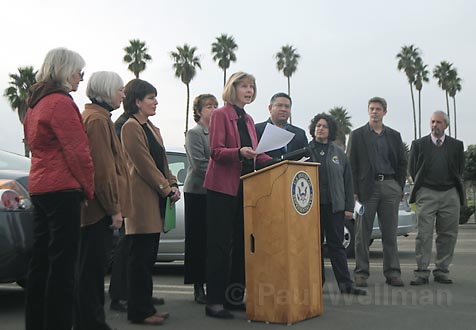Capps Praised for Energy Act Passage
Local Politicians, Leaders Gather to Discuss Environmental Policy

Local politicians and environmental leaders gathered Thursday morning to thank Rep. Lois Capps and celebrate the passage of the Energy Independence and Security Act, which, among other things, will raise the fuel efficiency standards for cars and trucks for the first time in over 30 years. The legislation “reaffirms the values that we have” in Santa Barbara, said 1st District Supervisor Salud Carbajal and, “represents a historic shift in energy policy,” said Capps, who was on hand with 2nd District Supervisor Janet Wolf, city councilmembers Das Williams, Iya Falcone, Helene Schneider, and Mayor Marty Blum. “We’ve waited too long for this,” she continued. “[Capps was] instrumental in making this happen in Washington,” Carbajal told the group gathered in a Leadbetter Beach parking lot, backed by a fleet of hybrid cars that sat against the Pacific Ocean backdrop.
Tam Hunt, energy program director of the Community Environmental Council, who was also present, said that while he was optimistic with the steps made, there was more to be done. “Given the magnitude, there’s a whole lot more to the problem,” he said. “We don’t want to rest on our laurels.” The Community Environmental Council is running a program in Santa Barbara known as Fossil Free by 33, which aims for the city to be carbon neutral by 2033. And while the goal started off as more of a pipe dream, Hunt said, the “pie in the sky a few years ago is now looking more realistic.”
While another energy bill was passed in 2005, the Democratic-led Congress felt the need to take it to the next level with newer legislation. The Energy Independence and Security Act states that the nation’s fuel economy standard will be increased by 40 percent when it reaches 35 miles per gallon by 2020. The increase is the first since standards were initially implemented in 1975. Companies producing fuel will also have to meet a Renewable Fuel Standard, which requires them to use at least 36 billion gallons of biofuel in 2022 – nearly five times more than the current levels.
Capps and company are confident the new law will reduce global warming, increase national security, and provide “green” jobs to help the economy. Energy conservation and efficiency will also be increased by the act, according to the Bush Administration, through revisions that will increase the efficiency of heating and cooling products, motor efficiency, and home appliance efficiency. Lighting in federal buildings will also now require Energy Star products by the end of 2013. The bill should create some of the largest carbon emission cuts in the history of the United States. “This stuff makes sense for the environment and for the economy,” Capps said.



